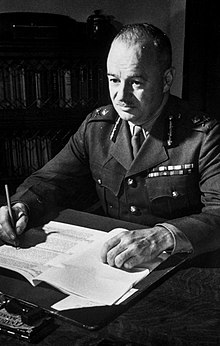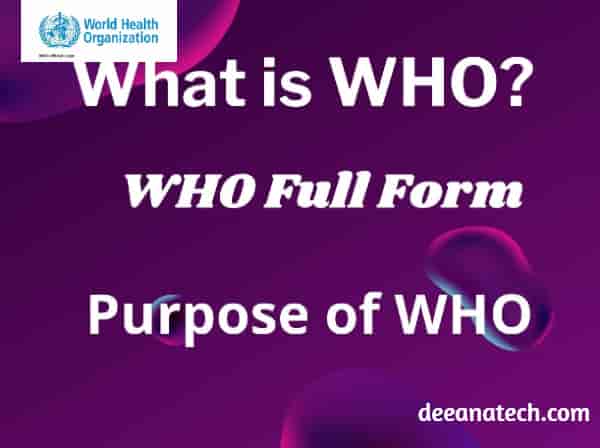What is WHO: The World Health Organization, commonly known as WHO, is a global organization that plays an important role in promoting and protecting international public health. Established in 1948, WHO operates under the umbrella of the United Nations and has since become a leading authority on health-related matters around the world.
WHO Full Form:
What's Next
WHO stands for the World Health Organization.
| Organization | Full Form |
|---|---|
| WHO | WHO Full Form- World Health Organization |
In this post we will give you complete information about what is WHO?, what you know about WHO, WHO in Hindi, and what the meaning of WHO. The full form of WHO. What is the full form, and What does WHO do?
W.H.O is the World Health Organization
WHO has a working unit in this country and is known as the WHO India Unit. This unit was established by the World Health Organization (WHO) and is located at the Permanent address World Health House, Indraprastha Estate, Mahatma Gandhi Marg, New Delhi 110 002, India, New Delhi.
WHO has a team of experienced and knowledgeable people who are involved in conducting various Health-related activities. These activities include writing research reports, research trials, and courses, setting up laboratories, training doctors, organizing health-related seminars and workshops, publication of the WHO Journal, taking part in monitoring activities related to the national health policy, and also on issues related to Universal Health Coverage.
History:
The idea of establishing an international health organization dates back to the late 19th century but gained significant momentum after the devastation of World War II. The purpose of creating WHO was to promote global cooperation in addressing health issues and preventing the spread of diseases across borders. The organization officially came into existence with the signing of the WHO Constitution on April 7, 1948.
What is the complete name of WHO, WHO is a non-governmental, non-profit, volunteer, and humanitarian organization of 179 Member States based in Geneva, Switzerland.
| Organization | Established |
|---|---|
| World Health Organization (WHO) | Established on 7 April 1948 |
| Member States | 194 Member States (as Dec 2023) |
WHO is one of the most successful and influential organizations in the world that has ensured health security and improved quality of life. All the member countries of WHO are responsible for defining their health policies. Some of the important policy-making decisions of WHO are as follows.
WHO is a UN-specialized agency. It is the leading global authority on disease control and prevention. It leads the efforts to fight the spread of communicable diseases, to improve health equity, and to help achieve the Sustainable Development Goals.
The Headquarters of WHO is in Geneva, Switzerland, which is the seat of the World Health Organization (WHO). WHO’s Deputy Director General, the core of WHO, is Dr. Tedros Adhanom Ghebreyesus. Dr. Tedros is a former Ethiopian Minister of Health.
Who HeadQuarters
| Organization | Headquarters |
|---|---|
| World Health Organization (WHO) | Geneva, Switzerland |
He has won the World Health Organization’s highest award, the International Leadership Award, for his leadership of efforts to address major health threats, including dengue, polio, cholera, and Ebola outbreaks. He is the first African to lead the WHO.
Purpose of WHO
- Disease Prevention and Control: WHO’s primary purpose is to combat the global spread of diseases. The organization works on preventing the outbreak of epidemics, controlling the spread of infectious diseases, and facilitating the development of vaccines and treatments.
- Health System Strengthening: WHO focuses on enhancing the capacity and efficiency of health systems around the world. This involves providing technical assistance, sharing best practices, and supporting countries in building resilient health infrastructures.
- Health Research and Development: The organization promotes and researches to advance our understanding of health issues. This includes research on diseases, healthcare practices, and the development of new technologies and interventions.
- Emergency Response: WHO plays a crucial role in responding to health emergencies and crises. Whether it’s a natural disaster, a disease outbreak, or a humanitarian crisis, WHO coordinates international efforts to provide timely and effective responses.
- Health Equity and Social Determinants: WHO advocates for health equity, addressing the social, economic, and environmental factors that contribute to health disparities. The organization strives to ensure that everyone, regardless of their socio-economic status, has access to essential healthcare services.
- Global Health Governance: WHO serves as the global health authority, setting international health standards, norms, and regulations. It facilitates collaboration among member countries, ensuring a coordinated approach to addressing health challenges on a global scale.
WHO is an inter-governmental organization that aims to improve public health. It was formed by a decision of the World Health Assembly in 1948. It is involved in health-related matters such as vaccination, disease control, epidemiology, sanitation, and water supply.
Its first objective is to establish the public health of the whole world. Also, it includes the member countries and provides them with all the resources needed to make the organization successful.
W.H.O. is the World Health Organization which plays a very important role in the health of the world. WHO was created on March 24th, 1948, and is responsible for protecting the health of people around the world, treating people who have health problems, and helping them have good health.
List of W.H.O Director-General
List of WHO has had 9 Director-General.
| Sl | President | Country | Term Start | Term End |
|---|---|---|---|---|
| 1 | Dr. George Brock Chisholm | Canada | 1948 | 1953 |
| 2 | Dr Marcolino Gomes Candau | Brazil | 1953 | 1973 |
| 3 | Dr. Halfdan T. Mahler | Denmark | 1973 | 1988 |
| 4 | Dr Hiroshi Nakajima | Japan | 1988 | 1998 |
| 5 | Dr Gro Harlem Brundtland | Norway | 1998 | 2003 |
| 6 | Dr LEE Jong-wook | South Korea | 2003 | 2006 |
| 7 | Dr Anders Nordström | Sweden, | 23 May 2006 | 3 January 2007 |
| 8 | Dr Margaret Chan | China | 2006 | 2017 |
| 9 | Dr Tedros Adhanom Ghebreyesus | Ethiopia | 2017 | Present |
7 *Appointed acting Director-General following the death of Lee Jong-wook while in office
WHO Director-General with their Specialty
| WHO Director-General | Assumed office | Specialty |
|---|---|---|
Brock Chisholm  | 1948–1953 | 1. Canadian psychiatrist, medical practitioner, World War I veteran |
Marcolino Gomes Candau | 1953 to 1973 | Brazilian doctor who served as director-general of the World Health Organization (WHO) |
Halfdan T. Mahler | 1973–1988 | He served three terms as director-general of the World Health Organization (WHO) from 1973 to 1988, |
Hiroshi Nakajima![Hiroshi Nakajima was a Japanese doctor known chiefly for his tenure as Director-General of the World Health Organization.[1]](https://deeanatech.com/wp-content/uploads/2021/06/Hiroshi-Nakajima.jpg) | 1988–1998 | 1. Hiroshi Nakajima was a Japanese doctor known chiefly for his tenure as Director-General of the World Health Organization. 2. From 1956 or 1958 to 1967 Nakajima worked at the French National Institute of Health and Medical Research |
Gro Harlem Brundtland | 1998–2004 | 1. Gro Harlem Brundtland Norwegian politician. 2. who served three terms as Prime Minister of Norway (1981, 1986–89, and 1990–96) 3. And as Director-General of the World Health Organization from 1998 to 2004 |
Lee Jong-Wook | 2004–2006 | 1. Lee Jong-wook was a South Korean public health doctor 2. working on a variety of projects including the Global Programme for Vaccines and Immunizations 3. and Stop Tuberculosis. |
| Anders Nordström* | 2006–2007 (22 May 2006 – 8 November 2006) | Nordström worked with the Swedish Red Cross in Cambodia and the International Committee of the Red Cross in Iran |
Margaret Chan | 2007–2017 | Margaret Chan Fung Fu-Chun physician, who served as the Director-General of the World Health Organization (WHO) |
Tedros Adhanom | 2017–present | 1. Tedros Adhanom is an Ethiopian biologist, 2. public health researcher, 3. and official who has served since 2017 as Director-General of the World Health Organization. |
Read More short forms and their full form
- What is the full form of TI?
- What is the full form of SI in Police Department
- What is the full form of T.I in Telecom Sector.
- TI Full form in Chemistry.
- Full form of TI in Indian Railway
- TI Ka full form kya hai in Mathematics
- Full form of RIP.
- What is the full form of RIP in hindi?
- RIP full form meaning
- Full Form of INDIA
- Full Form of UPSC, and What is UPSC?
- Full form of APK
- What is NDA Full Form?
- What is OPD?
- Full Form of MLA
- Full Form of Hmm
Work:
WHO’s work is multidimensional and spans a wide range of health-related activities. Some key areas of focus include:
- Infectious Diseases: Monitoring and controlling the spread of infectious diseases such as HIV/AIDS, malaria, tuberculosis, and emerging threats like COVID-19.
- Maternal and Child Health: Improving maternal and child health outcomes by providing essential healthcare services and promoting healthy practices.
- Non-Communicable Diseases: Addressing the growing burden of non-communicable diseases such as cardiovascular diseases, diabetes, and cancer through prevention and management strategies.
- Vaccines and Immunization: Supporting vaccination programs globally to prevent the spread of vaccine-preventable diseases.
- Health Systems Strengthening: Assisting countries in building robust health systems that can deliver quality healthcare to their populations.
Overview: World Health Organization (WHO):
| Parameter | Information |
|---|---|
| Full Name | World Health Organization (WHO) |
| Established | April 7, 1948 |
| Headquarters | Geneva, Switzerland |
| Director-General | Dr. Tedros Adhanom Ghebreyesus (as of 2023) |
| Member States | 194 (as of 2023) |
| Official Languages | Arabic, Chinese, English, French, Russian, Spanish |
| Mandate | To promote and protect international public health |
| Mission | Attainment of the highest possible level of health for all |
| Key Focus Areas | Disease prevention, health systems strengthening, global health governance, emergency response, research and development |
| Notable Achievements | Eradication of smallpox, global vaccination programs, response to pandemics (e.g., COVID-19) |
| Budget (2022-2023) | Approx. $6.13 billion |
| Key Publications | World Health Report, International Classification of Diseases (ICD), International Health Regulations (IHR) |
| Collaborative Partnerships | Collaborates with various UN agencies, governments, NGOs, and private sector entities |
| Emergency Response | Activates the Global Outbreak Alert and Response Network (GOARN) during health emergencies |
| Current Strategic Priorities | Universal Health Coverage, Health Security, Addressing Health Inequities |
| Notable Campaigns | Immunization campaigns, anti-tobacco initiatives, mental health awareness |
| Challenges | Funding gaps, navigating political sensitivities, addressing health disparities globally |
| Full Form | WHO Full Form- World Health Organization |










